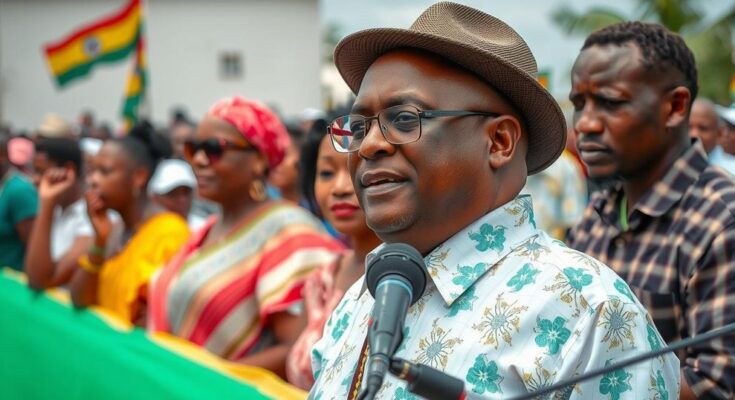Ghana’s December 7 elections feature a rivalry between former President John Mahama of the NDC and current Vice President Mahamudu Bawumia of the NPP. Mahama aims to establish a 24-hour business environment to support job creation, while Bawumia defends his party’s economic policies amidst challenges. Voter sentiment may lead to a competitive election focused primarily on economic issues, including inflation and illegal mining impacts on agriculture.
The upcoming election in Ghana on December 7 is shaping up to be highly competitive, particularly between former President John Mahama, who is representing the National Democratic Congress (NDC), and the ruling party’s candidate, current Vice President Mahamudu Bawumia of the New Patriotic Party (NPP). Mahama has promised to create a 24-hour business environment aimed at increasing job opportunities and rejuvenating an economy still recovering from a substantial $30 billion external debt default in 2022. Conversely, Bawumia maintains a commitment to enhancing the economy amidst recent challenges stemming from the post-COVID-19 landscape.
Historically, Ghana’s political landscape has been dominated by these two parties since 1992, making it unlikely for any minor parties to significantly disrupt the status quo. University of Ghana senior lecturer Kwame Asah Asante noted that minor parties have consistently underperformed, averaging below 5% in past elections, though there is some recognition that even minor gains could influence a runoff.
Amidst the political fervor, many Ghanaians express a degree of dissatisfaction with the longstanding two-party system. Angela Ofori, an undecided voter, commented, “Since 1992 to this year, we haven’t changed parties … we want [to] change to [a] different party so that we would see more improvements.” Among the newer candidates is Nana Kwame Bediako, an independent candidate appealing to the youth with promises of eco-friendly policies, although his impact on the election remains uncertain.
The economic backdrop is crucial to this electoral battle. Ghana, a leading cocoa producer, succumbed to a $30 billion debt crisis exacerbated by the COVID-19 pandemic and disruptions from the Ukraine war that impacted grain supplies across Africa. Asante emphasized that issues like infrastructure, health, education, and corruption are critical, yet the economy remains a predominant concern for voters. Taden observed that severe inflation has proven detrimental to the incumbents, echoing sentiments familiar in various democratic contexts, where economic strife often determines electoral outcomes.
The pervasive illegal mining activity, locally termed “galamsay,” poses significant threats to agriculture and environmental sustainability, affecting cocoa production and prompting many voters, including Wisdom Gavor and Janet Bawah, to seek change in governance. Bawumia’s supporters, however, heralded his digitization initiatives as transformative for modernizing the economy and improving job creation.
Ghana’s electoral process is generally characterized by stability, especially in a region marked by political upheaval. Although polls suggest varying outcomes, the battle between Mahama and Bawumia is poised to be fiercely contested, with significant implications for the nation’s trajectory.
The political climate in Ghana as it approaches its December 7 elections indicates a highly competitive landscape. Former President John Mahama, representing the National Democratic Congress (NDC), is faced with current Vice President Mahamudu Bawumia of the New Patriotic Party (NPP). Historical trends show that Ghana’s political scene has been dominated by these two parties since 1992, leading to complexities surrounding voter sentiment and potential shifts in allegiance amid economic challenges such as external debt and inflation.
In conclusion, the upcoming elections in Ghana are set against a backdrop of economic hardship and political discontent, positioning the match between John Mahama and Mahamudu Bawumia as pivotal for the nation’s future. Voter dissatisfaction with the historical two-party dominance could present opportunities for alternative candidates, although significant support remains for the main parties. Ultimately, the focus on economic recovery will significantly influence voter turnout and preferences as the election date approaches.
Original Source: www.voanews.com




